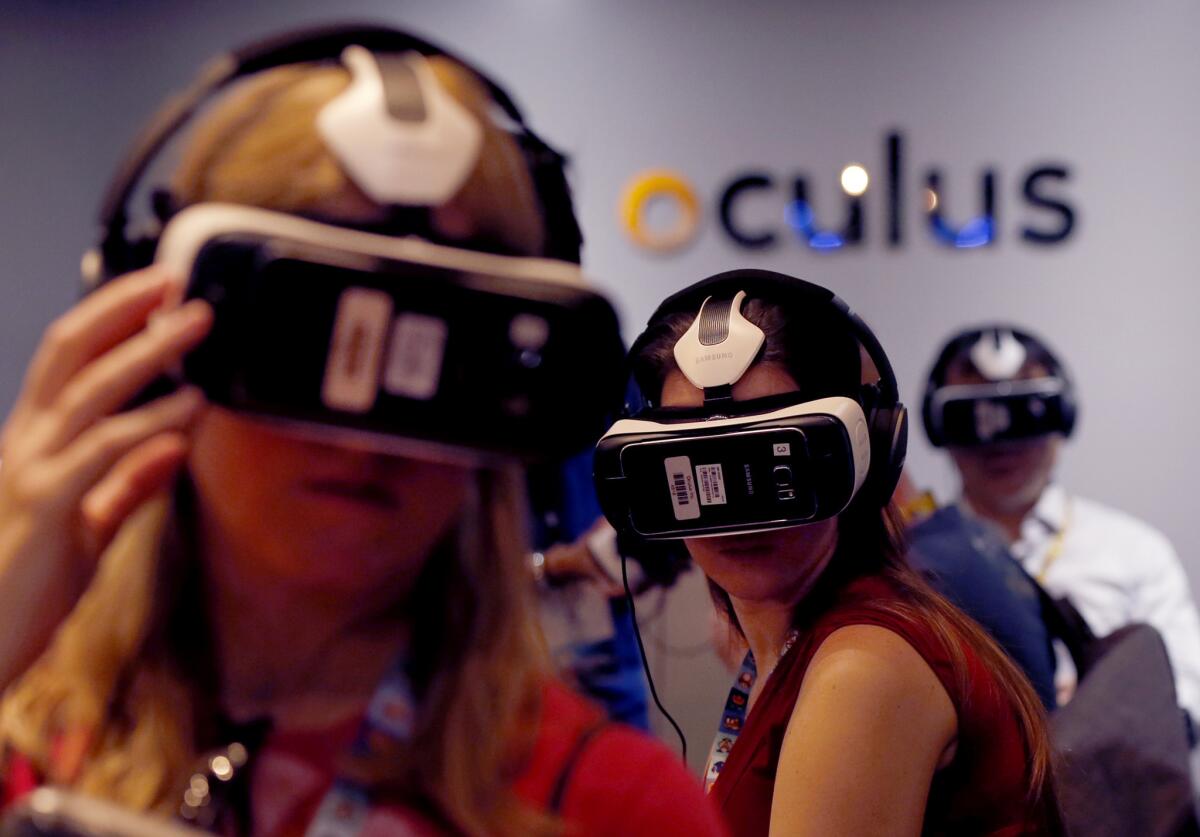Oculus Connect: 5 key questions at the big virtual reality conference in Hollywood

Video game enthusiasts try out the Samsung VR powered by Oculus virtual reality goggles at the E3 annual video game conference in Los Angeles on June 16.
- Share via
Oculus VR, the virtual reality technology company owned by Facebook Inc., is set to make several announcements Thursday in the final stretch before its first products start shipping early next year.
Palmer Luckey, who founded the company out of his parents’ Long Beach garage four years ago, said this week that “some really cool stuff” will be unveiled at the second annual Oculus Connect conference in Hollywood. He didn’t go into details.
Thousands of app developers, content producers, analysts and reporters attending the event are eager to see what Oculus shares about its first device.
The Oculus Rift is essentially a computer screen strapped to the head, producing a sensation of being dumped in a virtual world when video plays on the display.
Here are five concerns about the Rift and virtual reality technology that could be addressed at Connect this week.
Will Oculus highlight apps other than games when the Rift launches?
Analysts and developers have many explanations for why Oculus is placing a heavy emphasis on gaming (and dedicating nearly all of the Connect panels to the subject).
Luckey built the original, held-together-by-duct-tape Rift to make video games more exciting for himself. Gaming has a big online following, so it’s easy to generate buzz. Playing games is fun, which leads a user to forget there’s a big thing attached to his or her head.
But though early virtual reality devices will highlight gaming, many expect serious revenue to roll in when VR expands to apps for travel, real estate, healthcare, government, sports and, of course, TV shows and movies. Oh, and porn.
Even Facebook Chief Executive Mark Zuckerberg reportedly only agreed to pay $2 billion for Oculus after he was sure that the device would be fit for more than gaming.
“Gaming is proof of concept,” said Michael Pachter, a Wedbush Securities financial analyst who follows gaming companies. “It’s analogous to GoPro leading with action sports as a use case, even though the mainstream use is to film kiddie soccer games.”
Developers would like to see some of those other applications, many of which have been built, get more attention.
“If you come out just as games platform, you’re going to lose the interest of the audience,” said Adam Orth, founder of game developer ThreeOneZero. “I know as a consumer, I want to do other things. Any type of weird or different thing that they bring out, it’ll be super-interesting.”
What does the final Oculus Touch controller look like?
Oculus excited app developers earlier this year with controllers for the headset that comfortably slip into the grip of the hand. But executives cautioned that the Oculus Touch was a work in progress.
What kind of upgrades will the controller get? And will the headset also get enhancements to make it as powerful as a competing device from HTC called the Vive?
What will it take to get in the app store?
Oculus has said apps and content for the Rift will be available through an online Oculus Store. The final requirements to get in and how developers will generate revenue from the store could be among Thursday’s new details. The company could also showcase “launch” titles -- games that are specially or exclusively developed for the Rift -- that will get prominent placement in the app store. Those could create a marketing hurdle for other developers.
How will success be measured?
Daily users, revenue per user, time spent on the app -- all are popular ways to measure how well a smartphone app is doing. The same measurements should work in virtual reality. But Brian Blau, a consumer products analyst at Gartner, is among those interested to see if there’s other data to consider.
“How long will people wear a [headset], what are the put on/take off patterns that are emerging,” he said in an email. “Knowing this will give you an idea about long-term engagement behaviors.”
For instance, at the industry’s Proto Awards on Tuesday, Venice start-up WeVR said people had collectively spent the equivalent of 560 days inside its award-winning app that puts viewers underwater with a blue whale. Such data is important to raising funds from venture capitalists.
Developers will be watching to see whether Oculus itself brings up statistics about content that’s been tested over the last year.
How long will experiences be?
Most of what people try on the headsets today rarely extends past 10 minutes.
Orth’s company and several others have been working on longer experiences. ADR1FT, the first game from ThreeOneZero, should last nearly four hours. That’s comparable to “Call of Duty,” a popular console game that takes up to eight hours, Orth said.
Whether an experience of several hours becomes a norm for length will be up for exploration.
“We’re trying to find a way to make full complete experience that you’re going to want to be in VR for a while,” Orth said. “I think that nobody knows right now how long people can stay in.”
He noted he’s only twice played his game straight through.
“I’m not advocating for people playing our game in one sitting,” he said. “But if you can, more power to you.”
Chat with me on Twitter @peard33
ALSO:
Facebook now supports 360-degree video
Apple is refunding all purchases of ad-blocking app Peace
Disney leads $65-million investment into virtual-reality film company Jaunt







